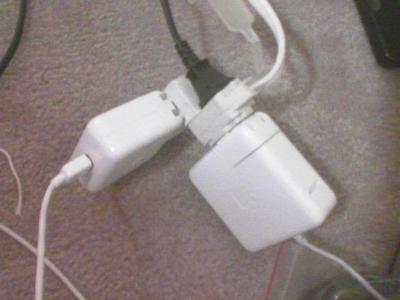
I was hooking up the electronic hub in my new place (that's my fancy way of saying I was setting up the stereo) when I noticed the beautiful geometric shape formed by the intersection of plugs. Specifically, the angles got really interesting when I added a 1-3 plug going into the extension cord to fit the iPod power supply and the iBook plug. The black plug is for my power amp. Preamp and CD player (which I seldom use anymore) are going into a separate outlet on the other side of the stereo.
Anyway, I was struck very strongly -- for the umpteenth time -- just how extraordinary all this technology is. I now have about 300 CDs on my tiny iPod, and it's amazing to be able to play any one of them on demand through my stereo but then to also simply grab the thing and have the entire vast library available in my car and at the gym, too.
Even more astoundingly, my laptop has a wireless connection so I'm able to wander the house, sit around in my pjs (metaphorically speaking), and participate in a global conversation and database. Wired "Senior Maverick" Kevin Kelly has a stunning article in last month's issue about how mind-boggling the web's ten years has been. I can't resist these excerpts:
The scope of the Web today is hard to fathom. The total number of Web pages, including those that are dynamically created upon request and document files available through links, exceeds 600 billion. That's 100 pages per person alive.
How could we create so much, so fast, so well? In fewer than 4,000 days, we have encoded half a trillion versions of our collective story and put them in front of 1 billion people, or one-sixth of the world's population. That remarkable achievement was not in anyone's 10-year plan.
I noticed this with bemusement years ago. I used to read a highly influential cyberpunk magazine called Mondo 2000 back around 1990 or so. This San Francisco-based mind-bender of a magazine covered everything from artificial intelligence to virtual reality to psychedelic drugs to new theories of consciousness and reality. They were early adapters of email and other embryonic electronic networks, such as bulletin boards.
And yet, these tripped-out visionaries didn't see the World Wide Web coming. They totally missed it. (As Kelly points out, so did everyone else). There's nothing in any of those jaw-dropping early issues that describes a future even remotely as connected as the present we live in today. And this is still only the beginning.
Kelly again: The accretion of tiny marvels can numb us to the arrival of the stupendous. Today, at any Net terminal, you can get: an amazing variety of music and video, an evolving encyclopedia, weather forecasts, help wanted ads, satellite images of anyplace on Earth, up-to-the-minute news from around the globe, tax forms, TV guides, road maps with driving directions, real-time stock quotes, telephone numbers, real estate listings with virtual walk-throughs, pictures of just about anything, sports scores, places to buy almost anything, records of political contributions, library catalogs, appliance manuals, live traffic reports, archives to major newspapers - all wrapped up in an interactive index that really works....
This view is spookily godlike....
Why aren't we more amazed by this fullness? Kings of old would have gone to war to win such abilities. Only small children would have dreamed such a magic window could be real. I have reviewed the expectations of waking adults and wise experts, and I can affirm that this comprehensive wealth of material, available on demand and free of charge, was not in anyone's scenario. Ten years ago, anyone silly enough to trumpet the above list as a vision of the near future would have been confronted by the evidence: There wasn't enough money in all the investment firms in the entire world to fund such a cornucopia. The success of the Web at this scale was impossible.
But if we have learned anything in the past decade, it is the plausibility of the impossible.
Later in the article, he states:
There is only one time in the history of each planet when its inhabitants first wire up its innumerable parts to make one large Machine. Later that Machine may run faster, but there is only one time when it is born.
You and I are alive at this moment. [snip]This will be recognized as the largest, most complex, and most surprising event on the planet.
Well, that about sums up how I feel, too. I consider the Internet to be the most important invention in the history of life on earth, and it amazes me that more people don't appreciate just how profoundly it is transforming and benefitting humanity. We are fortunate beyond imagining to be living in such times.
3 comments:
Thanks, anonymous. To all the rest of you, anonymous is responding to three previous spam comments -- which I deleted --complementing me on my blog's brilliance and inviting me to try their moneymaking web ventures.
Whenever the geometry gets sacred enough, there'll be sacred scumbags peddling bogus schemes...
So...
...how does the stereo sound?
- Greg
Not bad, but the B & W's are getting old (they're over 25 years old!), plus I have my TV in the middle of it, also wired through, and I tend to use the iPod for music. So it's hardly an audiophile setup, but it's pretty thumping great nonetheless.
Post a Comment